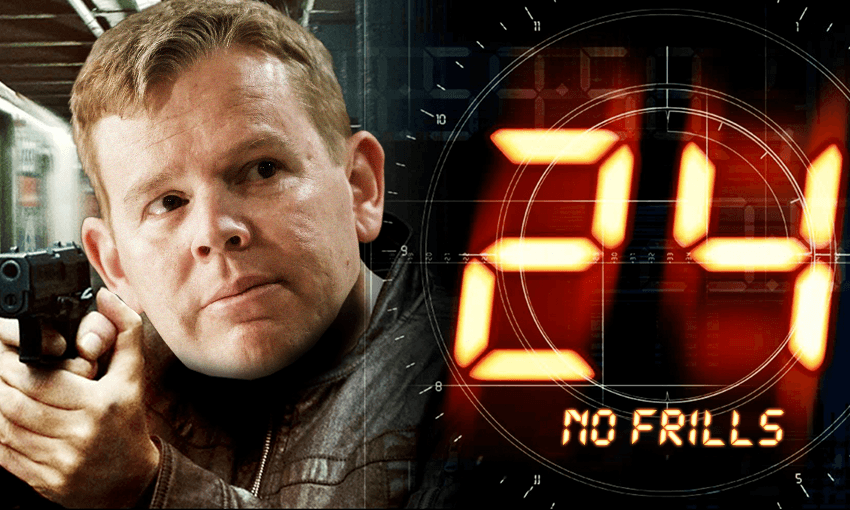A full day was barely done before Chris Hipkins declared his ‘no-frills’ budget had no place for a wealth tax. But what about at the election?
The scene: Autumn in the South Pacific. David Parker as Jack Bauer, our dynamic, devilishly clever protagonist, bounding about the place in principled pursuit of “The 311”, a group of fantastically wealthy families and their hardworking assets. Think luxury cars. Speedboats. Helicopters. And one “truly groundbreaking” spreadsheet.
At the outset of the series, Agent Parker addresses a university lecture theatre, laying out the severity of the imbalance in effective tax rates. It is 12.30pm on Wednesday, and the clock is ticking. We remain on the edge of our seats through the night, as revenue nerds, political animals and puffed-up pundits exchange fire on the case for a wealth tax. Taxvangelist Parker bursts through smoke and debris, landing barefoot and undaunted on that most fearsome of armoured tanks: a think-tank.
And then, in the series finale, 24 hours and a few minutes later, the prime minister takes the stage. Parker watches from behind a shrubbery at the Employers and Manufacturers Association as Chris Hipkins fires salvo after salvo of wholesome chip butties from a bread and butter bazooka. The Big Tax Energy is shot clean out of the sky.
Follow Gone By Lunchtime on Apple Podcasts, Spotify or your favourite podcast app.
“You will have seen that yesterday Minister Parker released work IRD have done on the tax that a small number of very high wealth individuals pay in New Zealand,” says the boss. “And while that work highlights gaps in the tax treatment of the income generated off their assets, I want to be crystal clear with you today,” he continues, surveying the room with homebrand solemnity. “The government will not introduce any major tax changes like a wealth tax or capital gains tax in this budget.”
“This will be a no-frills budget, as befits the times we are in. It’s about getting the basics right,” he says, picking a wholegrain from his teeth. “We’re not going to rock the boat by introducing major new taxes like a wealth tax or capital gains tax or a new cyclone levy in the budget.”
Parker slinks off into shadows, shaking his fist at The 311. As he fastens his harness and leaps from the EMA roof and the final credits begin to roll, Parker snarls: “Every political party will have access to that same information and they can formulate their tax policies and set them out before the next election.”
To be honest, almost no one was seriously imagining that the prime minister was going to signal a wealth tax, a “tax switch” or any other substantial fiscal reforms in his speech today, three weeks out from budget day. But that the prime minister decided to deploy the extinguisher just 24 hours on tells its own story.
A new wealth tax in Labour’s 2023 manifesto is not impossible. The internal debate may still be alive. But since he was propelled unopposed to the ninth floor in January, Hipkins has steadfastly stuck to a small-target script of refocus, back-to-basics, bread-and-butter and – a new variation launched today – a “no-frills budget”. Given that deeply cautious pragmatism, and the burnt fingers endured by Labour on CGT since the days of Phil Goff, it would take a truly Jack Baueresque plot twist to see Hipkins turn around in the months to come and pledge a bold new wealth tax after all.
That doesn’t mean Parker’s spotlight on The 311 will be entirely in vain, however. While National can say that as long as Hipkins keeps his rule-out commitment to the budget only, a sneaky CGT could be up his sleeve, Labour won’t hate the cyclorama of the IRD report flapping away. They won’t hate the backdrop to the 2023 election being an image of the wealthiest New Zealanders paying relatively low rates of tax compared with the rest of us.
Much likelier than a bold new approach to tax predicated on the gap identified 24 hours ago is something tactical. A tax policy that sees a further upwards tweak for the very highest earners in income tax, say. Such a manoeuvre would be less about addressing the “fundamental unfairness in our tax system” that David Parker divined in the IRD report, however, and more about getting the series renewed.





